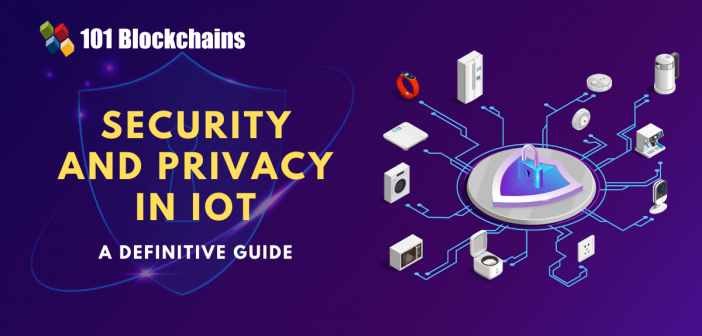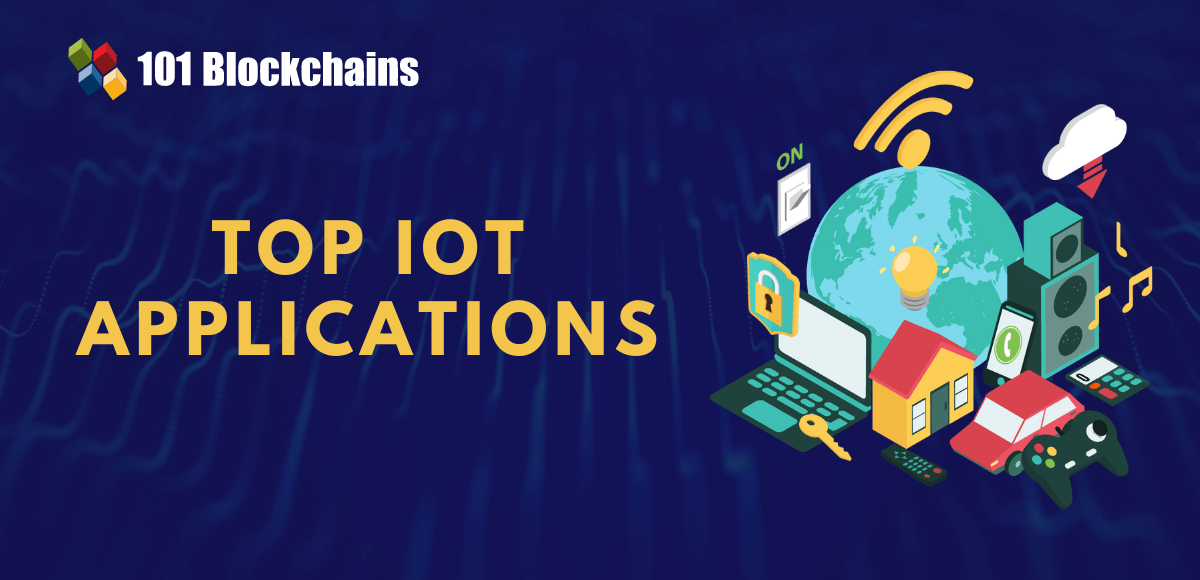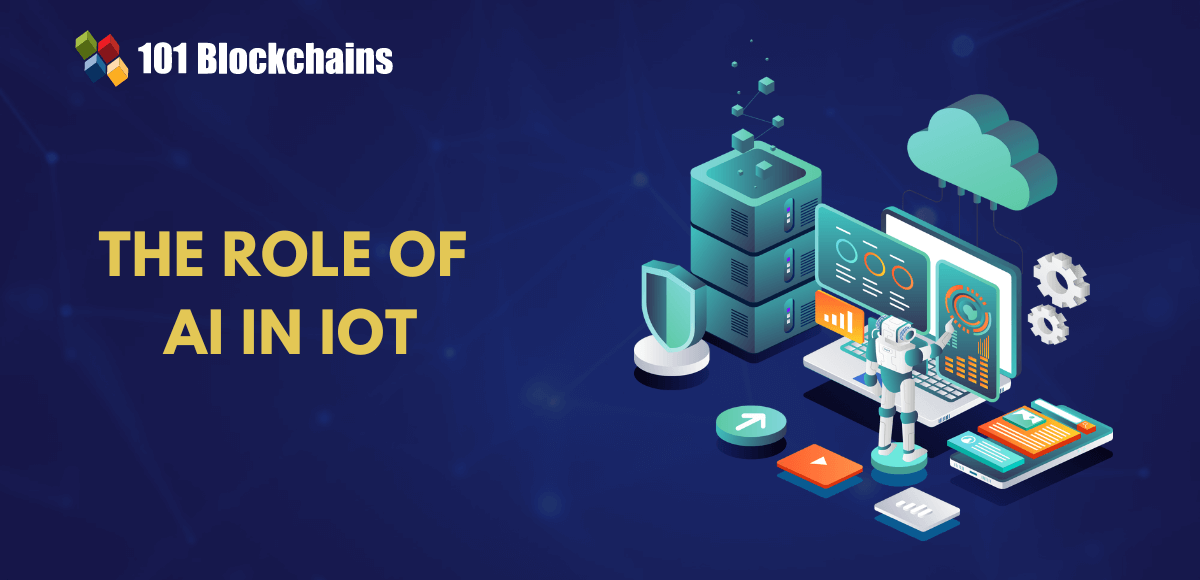Learn how blockchain truly works, master key definitions, and uncover what makes smart contracts so "smart." Dive into the fundamentals, gain valuable insights, and start your blockchain journey today!

- IoT
Gwyneth Iredale
- on October 08, 2021
Security & Privacy Issues in the Internet of Things (IoT)
The concept of the Internet of Things (IoT) has completely transformed the way we perceive connectivity. With IoT, we have seen devices, apart from personal computers, connecting to the internet. IoT has enabled the possibility for embedding internet connectivity and relevant functions in various types of devices.
The world has witnessed rapid growth in the connectivity of televisions, cars, refrigerators, air conditioners, hairbrushes, and many other devices to the internet. At the same time, the concerns regarding security and privacy in IoT have also gained prominent attention as the world recognizes the true potential of IoT. The following discussion aims to offer a detailed overview of the types of security and privacy issues you can find with IoT.
Want to learn how you can use blockchain in the Internet of Things (IoT)? Join Yearly/Yearly+ Plan and get free access to the Getting Started with Blockchain And IoT Course Now!
Importance of IoT
Before diving into the issues of privacy and security in IoT, it is important to understand IoT itself. In the most general sense, IoT refers to the global network of connected devices which share information with each other through the internet. The devices communicate with each other alongside generating and collecting data for ensuring optimized functionality.
As a matter of fact, IoT devices collect data regarding individual users and could contain extremely private and sensitive information. In addition, it is also important to note that the IoT market would have a value of more than half a trillion dollars by 2022. The growing IoT landscape implies the addition of more devices, thereby leading to concerns of security and privacy.
Want to understand the fundamentals of the Internet of Things (IoT)? Join Yearly/Yearly+ Plan and Enroll Now in IoT Fundamentals Course!
Importance of Security and Privacy in IoT
The Internet of Things or IoT landscape includes more devices with every passing day. By 2025, the world could expect around 64 billion IoT devices in use. The growth in the number of IoT devices is definitely beneficial with a major transformation in the ways for carrying out everyday activities. For example, smart lighting could help in reducing your electric bill and energy consumption.
In addition, the benefits of connected healthcare devices have been helping people in obtaining a better impression of their health. However, the benefits introduce prominent risks with the number of growing devices. The growth in the number of connected devices in the IoT ecosystem can present issues for security in IoT by offering more entry points for cybercriminals and hackers.
The concerns of security and the issues of privacy in IoT present considerable implications for different business organizations and public organizations. The interconnectivity of networks in IoT introduces the accessibility from anonymous and untrusted online sources. If anyone asks ‘Why security is important in IoT?’ you can point out IoT adoption.
Businesses have to work on enhanced security, especially for consumer-grade IoT-enabled solutions, to encourage customer trust in IoT. Furthermore, the importance of security and privacy in IoT is also clearly evident in the gradually increasing awareness of consumers regarding the privacy of their data.
Start learning Blockchain IoT with World’s first IoT (Internet Of Things) Skill Path with quality resources tailored by industry experts Now!
Understanding the Concept of Security in IoT
Now that you know about the importance of security and privacy for the long-term growth of IoT, it is reasonable to reflect on both of them individually. What are the factors associated with the concerns of security in IoT? The Internet of Things landscape is gradually becoming more diverse with legacy computing systems and modern computing devices. As a result, IoT easily becomes vulnerable to a wide range of security risks in different approaches.
First of all, it is important to note that many devices in the IoT landscape are tailored for large-scale deployment. The example of such devices refers to sensors. In addition, deploying IoT devices also involves a set of similar or almost identical appliances with resembling traits. The resemblance is responsible for magnifying the security vulnerabilities. While security issues have been prominently noted in the information and technology sector, IoT implementation has come up with some new challenges.
The answer to ‘Why security is important in IoT?’ is evident in the nature of interconnectivity between the IoT devices. If a poorly secured device connects with the IoT landscape, then it could affect the security and resilience of IoT. With a large number of homogenous devices deployed in IoT, the IoT users and developers must ensure that they are not exposing other users to potential harm.
One of the most prominent factors to draw your attention towards security in IoT would refer to authentication. The authentication mechanisms used in existing IoT ecosystems are restricted only to offering safeguards against limited threats such as replay attacks or Denial of Service (DoS) attacks. It is also important to consider the role of information security as one of the highly vulnerable domains of IoT authentication. Why?
The abundance of risky applications which enable a natural multiplicity of data collection could present formidable information security risks. In addition, the importance of security becomes clearly evident with the prevalence of man-in-the-middle attacks. Third-party agents could intercept communication channels for impersonating identities of vulnerable nodes associated with network exchange.
Want to familiarize yourself with the technology stack associated with IoT? Join Yearly/Yearly+ Plan and Enroll Now in Internet Of Things (IoT) – Intermediate Level Course!
Understanding the Concept of Privacy in IoT
The next notable aspect in discussions on privacy and security in IoT refers to the way consumers view privacy. People are likely to perceive the usefulness of IoT in accordance with its effectiveness in safeguarding their privacy goals. The common assumptions regarding privacy issues in IoT and the potential security issues could become formidable setbacks in IoT adoption.
The aspects of user privacy and the rights of privacy are basic requirements for developing the trust and confidence of users in IoT, connected devices, and associated services. At the same time, the developments in IoT are focusing largely on addressing privacy issues in a completely new way.
One of the most important concerns in understanding the issues of privacy in IoT would draw attention towards reasons for privacy concerns. The IoT ecosystem has intelligent artifacts present almost everywhere with flexibility for sampling process and information distribution from any location.
In addition, the ubiquitous connectivity in IoT through the internet also plays a crucial role in amplifying privacy concerns. Without a unique mechanism for privacy protection, the ubiquitous connectivity of IoT could enable flexible access to personal information from any corner of the world.
Build your identity as a certified blockchain expert with 101 Blockchains’ Blockchain Certifications designed to provide enhanced career prospects.
Security Issues in IoT
With a clear impression of the significance of security and privacy in IoT, it is important to find out the issues. Businesses could reap credible benefits from the capabilities of the Internet of Things (IoT). However, the threats to security could present notable setbacks for the effective adoption of IoT-enabled solutions. On the other hand, a clear impression of the IoT security issues could help in developing suitable strategies for mitigation. Let us take a look at some of the notable issues for security in IoT.
-
Inadequate Password Protection
Hard-coded and embedded credentials in IoT devices provide an easy target for hackers to compromise the devices directly. Default passwords may enable hackers to enter the machine without any obstacles. One of the examples of such an attack refers to the Mirai malware, which infected IoT devices such as routers, video recorders, and video cameras. The Mirai malware was successful in logging in by using 61 general hard-coded usernames and passwords.
Subsequently, the malware brought almost 400,000 connected devices in its control and resulted in the world’s first 1Tbps DDoS attack. The Distributed Denial of Service of DDoS attack affects some parts of Amazon Web Services and its clients such as Twitter, Netflix, Airbnb, and GitHub. Now in 2021, a Mirai-type malware, known as Mozi, is the most active botnet.
Here’s a list of Blockchain Security Algorithms Used To Protect The Blockchain Security
-
Limited Compliance from IoT Manufacturers
Another important factor affecting the security factor in privacy and security in IoT refers to the lack of compliance from IoT manufacturers. Many fitness trackers with Bluetooth generally remain visible after pairing. Your refrigerator could give out your Gmail login credentials.
As manufacturers continue the development of devices with limited security, the concerns of security in IoT would definitely witness an upward turn. IoT device manufacturers have started introducing internet connectivity in their devices without paying attention to the ‘security’ aspect in the product designing process. Some of the notable security risks for IoT which are due to manufacturers include,
- Hardware issues
- Lack of security in data transfer and storage
- Hard-coded, weak, or guessable usernames and passwords
-
Device Update Management
The concerns of security and privacy in IoT could also refer to security issues due to device update management. Insecure firmware or software could generally lead to IoT security risks. Even if a manufacturer offers a device with the most recent software update, you will encounter new vulnerabilities.
Therefore, updates are highly important for ensuring security on IoT devices, which should be updated immediately after the discovery of new vulnerabilities. The use of IoT devices without necessary updates could escalate the threats to their security. In addition, update management can be risky due to the fact that devices will send backups to the cloud. Without appropriate encryption for the connection and protection for updated files, any malicious agent could access sensitive information.
-
Lack of Secure Interfaces
The answers to ‘Why security is important in IoT?’ become clear with the security issues due to insecure interfaces. All IoT devices are involved in the processing and communication of data. The IoT devices need apps, protocols, and services for communication, and the insecure interfaces are responsible for various IoT vulnerabilities.
You can find insecure interfaces in web, API, cloud, mobile, and application interfaces with possibilities for compromising the device and data. The most common concern of security in IoT interface is the lack of device authorization and authentication mechanism and weak or no encryption mechanism.
Blockchain technology undoubtedly has many benefits, especially cryptographic security, albeit with several issues. Check out the notable blockchain security issues!
Privacy Concerns in IoT
While the challenges to security are quite prevalent in IoT, the concerns of privacy are also another critical factor. Many people also want to find out ‘What are the privacy concerns in IoT?’ and the answers could help in improving IoT for large-scale adoption. Let us take a look at some of the common privacy concerns in IoT which you can find today.
-
Abundance of Data
The data generated by IoT devices is radically staggering for all the right reasons. According to the Federal Trade Commission, less than 10,000 households could create almost 150 million discrete data points daily. Therefore, you can clearly notice the increased possibilities for breaches of privacy in IoT. You have more entry points for hackers while leaving sensitive information and your IoT devices vulnerable.
-
Eavesdropping
IoT users would also have to find eavesdropping as one of the ominous answers to ‘What are the privacy concerns in IoT?’ for specific reasons. Imagine a hacker using one of your smart home appliances to snoop in your personal life. As a matter of fact, hackers and even manufacturers could use a connected device to basically invading an individual’s home.
For example, researchers have been successful in eavesdropping in IoT by intercepting unencrypted data from a smart meter device. The unencrypted data helped in identify the television show an individual was watching at the particular instance of time.
-
Unwanted Public Exposure
The next and probably the most important entry among privacy issues in IoT would refer to unwanted public exposure. IoT device manufacturers often have long documentation for terms of service, and there is barely anyone who reads the document thoroughly. According to the Federal Trade Commission, manufacturers and enterprises could leverage data offered willingly by consumers for making employment decisions.
For example, an insurance company could collect information from an individual regarding their driving habits through a connected car. Similarly, health or life insurance providers could also use data from fitness trackers for calculating the insurance rates of different individuals.
We have a Insightful webinar on Scalability, Confidentiality and Data Privacy Issues For Enterprise Blockchains. Become a member now to watch this on-demand webinar!
Bottom Line
It is quite clear that the Internet of Things or IoT is all set to transform the way we perceive devices. Now, it is possible to connect almost every device we can think of to the internet. As a result, the continuously expanding network of IoT devices could only amplify the concerns of security and privacy in IoT.
At the same time, it is also inevitable to note that security and privacy issues are common in the domain of information and technology. You can also think of IoT in parallel with the domain of information and technology to understand how an understanding of the security and privacy issues related to IoT would support its long-term growth. Learn more about IoT and develop a better understanding of the security and privacy risks.





